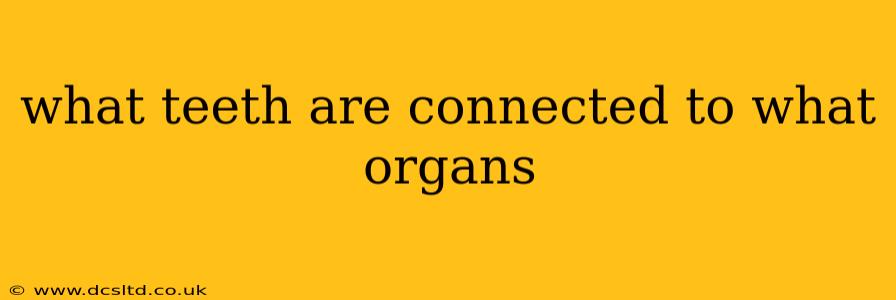What Teeth Are Connected to What Organs?
The idea that specific teeth are directly connected to particular organs is a concept rooted in traditional medicine, particularly in practices like Traditional Chinese Medicine (TCM) and Ayurveda. However, modern Western medicine does not support this claim. There's no scientifically proven direct anatomical or physiological link between individual teeth and specific internal organs. The belief stems from energy meridians and energetic connections, concepts that are not validated by current scientific understanding of human anatomy and physiology.
While there's no direct connection, it's crucial to understand the potential indirect relationships:
Indirect Connections and Potential Impacts:
-
Infection: Dental infections, such as abscesses or gum disease (periodontitis), can spread through the bloodstream, potentially affecting other organs. This is a genuine medical concern, and untreated oral infections can contribute to conditions like endocarditis (heart infection), or worsen existing conditions like diabetes. This isn't a specific tooth-organ link, but rather a consequence of systemic infection.
-
Overall Health: Poor oral hygiene is linked to various health issues. For example, research suggests a correlation between periodontal disease and an increased risk of cardiovascular disease, stroke, diabetes, and respiratory infections. Again, this is not a direct connection of a specific tooth to an organ, but rather a consequence of overall oral health impacting systemic well-being.
-
Pain Referral: Sometimes, pain originating from an internal organ can be felt in the face, jaw, or teeth. This is known as referred pain, and it's a neurological phenomenon where nerve pathways can confuse the brain's perception of the pain's origin. This doesn't mean the tooth is the problem; the problem is in the organ, and the pain is felt in the tooth region due to the complex nerve pathways.
Frequently Asked Questions (PAA):
Are there any teeth related to the heart?
No, there is no scientific evidence supporting a direct connection between any specific teeth and the heart. However, severe gum disease or untreated infections in the mouth can spread to the bloodstream and potentially contribute to conditions like endocarditis, an infection of the heart lining. Maintaining good oral hygiene is crucial for overall cardiovascular health.
Which tooth is connected to the liver?
Similar to the heart, there's no scientifically validated connection between a specific tooth and the liver. The idea is rooted in traditional medicine systems but lacks supporting evidence in modern medical science. However, overall health, including liver health, can be negatively impacted by poor oral hygiene and chronic infections.
Does tooth pain mean something is wrong with my organs?
Tooth pain itself doesn't directly indicate organ problems. However, if the pain is accompanied by other symptoms like fever, fatigue, or changes in bowel habits, it's advisable to consult a doctor to rule out any underlying health issues. Referred pain, as mentioned, can sometimes make it feel like the pain originates from the tooth, even though the source lies elsewhere.
What organs are affected by bad teeth?
Bad teeth, more specifically, untreated dental infections and poor oral hygiene, can affect various parts of the body indirectly. This can include the heart (endocarditis), the brain (if an infection spreads), and other organs due to the risk of systemic infection. Chronic inflammation associated with poor oral health has also been linked to various systemic conditions.
In conclusion: While traditional medicine systems propose connections between teeth and organs, modern science hasn't found direct anatomical or physiological evidence. The focus should be on maintaining excellent oral hygiene, as poor oral health can have indirect and significant consequences on overall health and well-being. If you have concerns about your teeth or overall health, consult a dentist and your physician.
